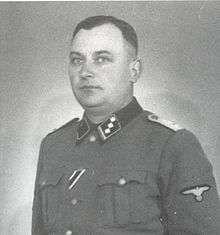Richard Thomalla
| Richard Thomalla | |
|---|---|
 | |
| Birth name | Richard Wolfgang Thomalla |
| Born |
23 October 1903 Annahof, Upper Silesia, German Empire |
| Died |
12 May 1945 (aged 41) Jičín, Czechoslovakia |
| Allegiance |
|
| Service/branch |
|
| Years of service | 1932–1945 |
| Rank |
|
| Commands held | Headed construction of Bełżec, Sobibor and Treblinka extermination camps during Operation Reinhard |
Richard Wolfgang Thomalla ![]() pron. (23 October 1903 – 12 May 1945)[1] was an SS-Hauptsturmführer (Captain) and a civil engineer by profession who was head of the SS Central Building Administration at Lublin reservation in occupied Poland and was in charge of construction for the Operation Reinhard death camps Bełżec, Sobibor and Treblinka during the Holocaust in German-occupied Poland.
pron. (23 October 1903 – 12 May 1945)[1] was an SS-Hauptsturmführer (Captain) and a civil engineer by profession who was head of the SS Central Building Administration at Lublin reservation in occupied Poland and was in charge of construction for the Operation Reinhard death camps Bełżec, Sobibor and Treblinka during the Holocaust in German-occupied Poland.
Born in Annahof in the former Upper Silesia region of the German Empire (now, the village of Sowin, Opole Voivodeship, Poland). Thomalla became a member of the Nazi Party in 1932: (no. 1,238,872) and SS (no. 41,206).
World War II
_II.jpg)
The first death camp to be constructed under Thomalla's supervision was Bełżec. Construction started on 1 November 1941 and was completed in March 1942. He then proceeded to design and supervise the construction of Sobibor in March 1942. Workers employed for building the camp were local people from neighboring villages and towns. During this preliminary stage, Thomalla served as the head of the Sonderkommando at Sobibor.[2] The Sonderkommando consisted of about eighty Jews from ghettos within the vicinity of the camp, brought to Sobibor for slave-labor construction work. A squad of ten Ukrainians trained at Trawniki concentration camp guarded the Sonderkommando. Upon completion of the camp, these Jews were shot.[3] When Thomalla completed his building assignment in Sobibor he was replaced there by Franz Stangl in April 1942. He then proceeded to Treblinka which copied the design of Sobibor.
SS-Unterscharführer (Corporal) Erwin Lambert who had previously been assigned to the Action T4 euthanasia program and had constructed the new gas chambers in Treblinka, testified about Thomalla:
I and Hengs – euthanasia man – went to Treblinka by car. SS-Hauptsturmführer Richard Thomalla was the camp commander. The Treblinka camp was still in the process of construction. Thomalla was in Treblinka for about four to eight weeks. I was attached to a building team there. Thomalla was there for a limited time only and conducted the construction work of the extermination camp. During that time no extermination actions were carried out. Then Dr. Eberl arrived as camp commander. Under his direction the extermination Aktionen of the Jews began. — Erwin Lambert [3]
Between July 1942 and October 1943, around 850,000 people were killed in Treblinka.[4][5] Thomalla was reportedly executed by the NKVD (Soviet Police) in Jičín, Czechoslovakia on 12 May 1945.[3][6]
References
- ↑ Sobibor - The Forgotten Revolt Archived January 24, 2012, at the Wayback Machine.
- ↑ Klee, Ernst, Dressen, Willi, Riess, Volker The Good Old Days: The Holocaust as Seen by Its Perpetrators and Bystanders, p. 231. ISBN 1-56852-133-2.
- 1 2 3 Yitzhak Arad (1987). Belzec, Sobibor, Treblinka: The Operation Reinhard Death Camps, Bloomington: Indiana University Press. ISBN 0-253-34293-7. See also: Erwin Herman Lambert at H.E.A.R.T 2007.
- ↑ Henry Friedlander. The Origins of Nazi Genocide: From Euthanasia to the Final Solution. The University of North Carolina Press, September 22, 1997. ISBN 0-8078-4675-9
- ↑ Naomi Kramer, Ronald Headland. The fallacy of race and the Shoah. University of Ottawa Press, November 25, 1998. ISBN 0-7766-0476-7
- ↑ Ernst Klee. Das Personenlexikon zum Dritten Reich: Wer war was vor und nach 1945. Fischer-Taschenbuch-Verlag, Frankfurt am Main 2005. ISBN 3-596-16048-0